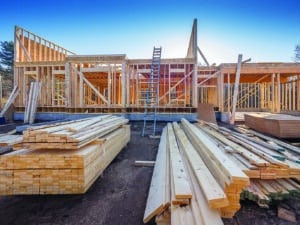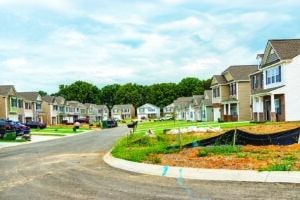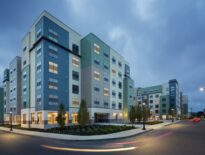
The deep decline in new home starts caused by the coronavirus pandemic will only put Massachusetts further behind in its race against demand for new homes.
There’s a lot we don’t know about the ultimate impact of the coronavirus crisis on the economy.
Will we have a V-shaped recovery, Great Depression 2.0 or something in between?
But despite the uncertain fallout for the housing market, one thing is not likely to change: The Bay State’s dubious title as one of the most expensive places in the country to buy a home or condominium.
Most people don’t out to buy a home when times turn tough, and the sudden spike in the jobless rate will shrink the pool of buyers over the next year or two.
Ordinarily, you’d think this would drag prices lower. But as the late, great Wellesley College economist Chip Case liked to say, home prices are “sticky” on the way down.
But it’s more than just stubborn homeowners refusing to sell unless they absolutely have to in the midst of the downturn, although that is a big factor that will prevent any precipitous decline.
The crisis is already putting a big dent in housing starts, with the Northeast leading the way down.
That means the long-standing and dire shortage of new homes and housing inventory overall in Massachusetts is likely to only get worse, with any decline in prices slow and grudging.
Housing Starts Fell 30 Percent
We got a first look at what’s likely to be a big drop in new home construction last week.
Housing starts in April posted their biggest percentage drop on record. The number of new homes builders started work on plunged more than 30 percent to an annualized seasonally adjusted rate of 891,000.
That’s the fewest starts since 2015, when the housing market was finally starting to recover from the Great Recession.
The local numbers aren’t out yet, but there is likely to be a big drop for the Boston area, with the Hub having locked down most residential construction between mid-March and mid-May amid the coronavirus crisis.
As restrictions are lifted, homebuilders large and small across the state will have to decide whether to push forward on projects or pull back until they get a better read on where the economy is headed.
Jeffery Rhuda, business development manager of homebuilding firm Symes Assoc. on the North Shore, said his firm is moving ahead on projects in Ipswich and other communities, but that sales of new homes for the past two months have ground to a halt.
“There is a lot of money out there, but nobody is buying,” Rhuda said. “We are in purgatory. We don’t know which way we are going.”
We probably won’t see another 30 percent drop after that April nosedive, but housing starts are likely headed down in the Boston area as the economic situation sorts itself out.

The limited supply of new homes will likely help keep home prices at or near current levels.
‘Fundamental Shortage’
This looming downturn in new single-family construction comes after years of anemic numbers.
We have had decades now of underbuilding caused by fierce local opposition to new residential construction, leaving us with some of the lowest inventories of homes for sale in decades.
And the number of homes for sale will only likely shrink over the rest of 2020 as builders pull back and as homeowners who don’t have to sell right now put their plans on hold.
“You already had in Massachusetts a fundamental shortage of housing,” Rhuda said. “The inventory pre-pandemic was a joke. It was the lowest inventory in my 39-year career.”
If the home sale and price numbers for March are any indication, we may see prices continue to edge up even as sales level off and then drop.
The median price for a single-family home in Massachusetts shot up 6.5 percent in March, hitting $402,000, according to The Warren Group, publisher of this newspaper. Sales edged up 2 percent.
Not All Downturns Equal
Then there is the “stickiness factor,” as Chip Case might have put it.
The only two recessions in the last 30 years that caused any sort of retrenchment in home prices in Greater Boston came in the early ’90s and then a little more than a decade ago in the Great Recession.
Both downturns saw prices fall a bit and then go sideways for a while before resuming their relentless march upwards.
This was especially the case in the recovery from the last recession in the well-off suburbs along the Route 128 near Boston and in the region’s urban core as well.

Scott Van Voorhis
By October 2016, the median home price in Lexington had already hit $1 million, for a 38 percent increase over its 2005 peak, while Wellesley and Newton rang in at $1.2 million and $1.1 million, up 40 percent and 30 percent over the same time period.
While the coronavirus downturn will certainly be deep, we don’t know yet how long it will drag on or how successful – or not – the multitrillion-dollar rescue efforts by the federal government and the Federal Reserve will be.
But while Boston-area home prices may very well flatten or even a decline a bit, we are still stuck with the same problem we had before, just worse: anemic home construction.
And until that changes, there will be no chance of any major reset in housing prices in Greater Boston.
Scott Van Voorhis is Banker & Tradesman’s columnist; opinions expressed are his own. He may be reached at sbvanvoorhis@hotmail.com.




 |
| 
